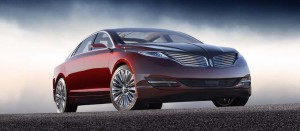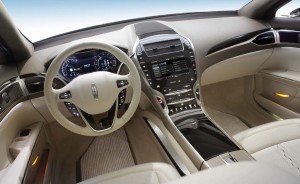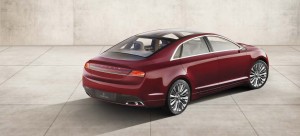Can this eagle spread its wings for Lincoln?
Once one of the dominant brands in the huge U.S. luxury market, Lincoln is little more than an after-thought for most of today’s buyers, trailing far behind dominant marques like BMW, Mercedes-Benz and Lexus – never mind its long-time domestic rival, Cadillac.
But Ford Motor Co. is hoping to put its high-line brand back on the radar screen with the upcoming launch of an all-new MKZ sedan – which debuted in concept form at the 2012 North American International Auto Show this week.
Like the production version, which will be revealed in a couple months, the MKZ prototype is a dramatic and transformational vehicle that abandons many of the familiar Lincoln cues, starting with the marque’s familiar waterfall grille. Instead, it offers a distinctive shape literally topped by an industry-first convertible glass roof. The overall look, suggests designer Max Woolf, was inspired by an eagle spreading its wings.
The MKZ Concept “is a strong indicator of what you can expect to see in the production vehicle,” says Derrick Kuzak, Ford’s global product czar, adding, “Now’s the right time to take the next step with Lincoln” after the brand took a couple modest steps signaling bigger changes were coming with the line of the 2012 MKT and MKS model.
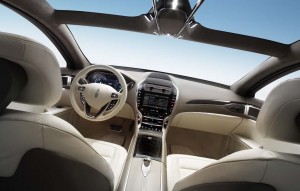
Other than the new grille, the most dramatic visual element of the new MKZ Concept is its retractable glass roof.
Big steps, indeed, the MKZ walking away from the vertical grille that has been around since Lincoln was founded by Henry Ford’s son, Edsel, more than eight decades ago. In recent years, hoping to gain attention, the waterfall grille has grown larger and larger, almost to absurd proportions. With the next-generation MKZ it is not only downsized but shifts to a horizontal orientation that does, indeed, resemble the silhouette of an eagle’s outstretched wings.
The overall look is decidedly smaller and sleeker than the old Lincoln entry-level sedan, which seemed to be based on the idea that it had to be a large mass moving down the road to be noticed.
The face not only features that new grille but headlamps that are small and sleek, almost slit-like, rather than the over-sized lamps that most manufacturers have been migrating to in a herd-like manner.
The most distinctive feature, however, is the all-glass roof of the MKZ which, on the production version will be fully retractable – more like a hard-top convertible than the current panorama roofs found on other luxury brands.
Ford has been toying with that idea for more than a quarter century. It has taken all that time to make the concept practical.
The interior of the new Lincoln MKZ Concept is inspired by a suspension bridge, notes designer Woolf, with a center console that appears to float between the front seats, providing additional storage below.
With its elegant, high-gloss finish, the center stack wraps around a large touch screen display which operates many key vehicle functions – though Ford engineers and designers have this time struck a careful balance to ensure that those buttons and switches a driver frequently accesses are back on the display’s surround so you don’t have to wade through several distracting menus to, say, adjust the interior temperature.
Along with software changes to make the screen easier to read and quicker to respond, the maker hopes that will overcome any remaining concerns about the LincolnMyTouch infotainment system.
The main gauges, visible through the steering wheel, are actually part of a 10-inch-wide reconfigurable LCD display. But the concept and production car both place another layer of acrylic rings over the key instruments – the speedometer and tach – to give the gauges a three-dimensional look missing in recent vehicles like the new Jaguar XJ’s virtual instrument cluster.
The overall look of the car is smaller, cleaner, both inside and out. The instrument panel, in fact, is 35% smaller than the one in the current Lincoln MKZ, giving the cabin a far less claustrophobic feel.
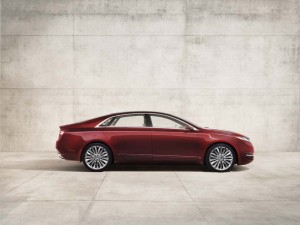
Power will come from a high-mileage 2.0-liter EcoBoost, with a hybrid version aiming for a 47 mpg rating.
One of the critical steps, meanwhile, was to make sure that the Lincoln MKZ update has a very distinctive look that is entirely its own. Unlike the current sedan, it doesn’t seem that key body panels were obviously shared with the down-market Ford Fusion – even though the new MKZ and striking new Fusion continue to be built off the same platform.
Whether they will feel like different cars remains to be seen. But talking with Lincoln engineers it is clear they set very different targets for the new sedan’s performance, ride and handling, aiming for an overall feel that is sporty without going to the extremes of a BMW.
The balance of looks and ride, insists Kuzak, should place the new Lincoln into its own space and not just make it feel like a clone of the existing automotive order.
Under the skin, the new Lincoln MKZ will feature a 2.0-liter EcoBoost inline-four that replaces the old 3.5-liter V-6 and, while delivering more muscle should also boost fuel economy by as much as 6 mpg. The target is an EPA-rated 27 mpg Combined. A hybrid-electric version, akin to the one going into the new 2013 Ford Fusion, will also be offered and should push the mileage number to 47 – which would mean a midsize Lincoln delivering about 4 mpg more than the latest-generation Toyota Camry Hybrid.
Significantly, Lincoln wants to have the new MKZ serve as a transition point for the brand on a broader basis than just product. The maker has been pressing its dealers to adopt a new, customer-centric approach that would see a visually more elegant showroom where potential customers are greeted by a concierge who handles the information and sales process much like the way the most exclusive boutiques on Beverly Hills’ Rodeo Drive operate.
That has created a bit of concern among dealers, a group of whom met on the Detroit show floor prior to the media unveiling of the new Lincoln MKZ to learn more.
The trick is for Lincoln to convince them to make a multi-million-dollar investment even before they see whether the new MKZ look – which will influence other upcoming products – can, indeed, make Lincoln relevant again.
But despite some grumbling, the oohs and aahs over the new Lincoln MKZ appeared to be the loudest sound coming from the dealer group.
Whether that response will be echoed by potential buyers when the new Lincoln MKZ comes to market later this year remains to be seen. But it’s clear the Ford luxury brand had no other option but to make a dramatic change or accept the likelihood it would become even more irrelevant.

